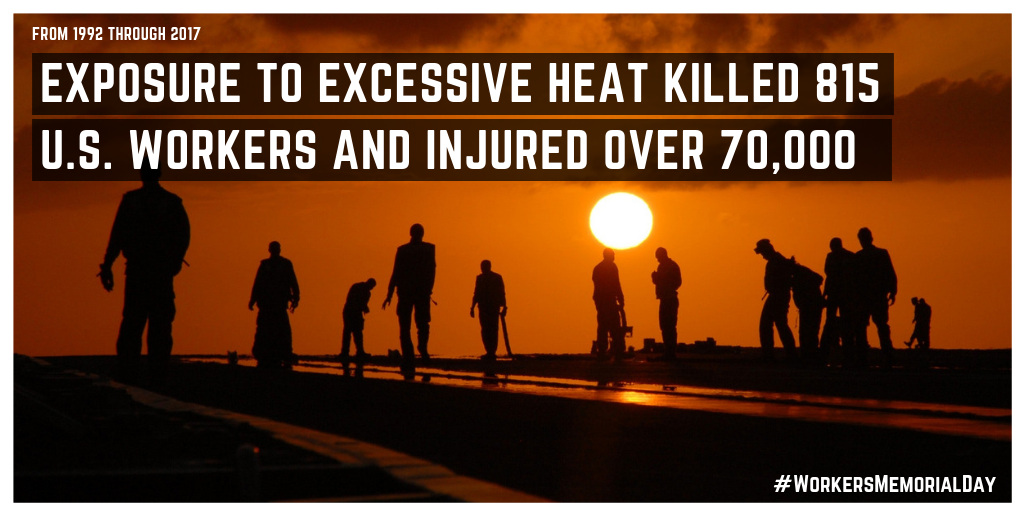Remembering Workers Who Died or Suffered on the Job Must Also Include Safeguards Against Heat
By Shanna Devine

During Workers’ Memorial Week (April 22- 28), Public Citizen joined with organizations across the country to remember fallen workers and fight for safer workplaces, including for employees exposed to the growing dangers of climate change and rising temperatures in the workplace.
According to the AFL-CIO, nearly 5,200 workers were killed on the job in the United States in 2017 alone, and millions more were injured or maimed. Heat stress killed 815 U.S. workers and seriously injured more than 70,000 workers from 1992 through 2017, according to the Bureau of Labor Statistics. Notwithstanding these alarming figures, many deaths – including heat-related fatalities – go underreported.
A broad coalition of advocacy groups and experts have mounted a campaign to pressure the U.S. Occupational Safety and Health Administration (OSHA) to establish protections for workers who are subject to extreme heat. In the summer of 2018, Public Citizen and a network of more than 130 labor, environment and public health organizations petitioned OSHA to issue a national heat stress standard. This petition marked the launch of a national campaign to win that standard and raise awareness about the impacts of climate change and rising temperatures on the health and safety of outdoor and indoor workers.
This Workers’ Memorial Week, more than 100 organizations submitted a joint letter to United States Department of Labor Secretary Alexander Acosta and Deputy Assistant Secretary of Labor Loren Sweatt. The letter calls for swift action from the Labor Department to enact protective policies to shield workers from the growing dangers of climate change and rising temperatures in the workplace.
The language of the letter also memorializes some of the workers we have lost from heat-related fatalities, “Behind the statistics are individual workers who will never return home after a hard day’s work, or who will be forever changed from irreversible injuries and illnesses.” Last year, Peggy Frank, a 63-year-old mail carrier for the United States Postal Service, died from hyperthermia (an abnormally high body temperature) in her non-air-conditioned mail truck on a day that reached 115 degrees. A decade earlier, in 2008, Maria Isabel Vasquez Jimenez, a pregnant teen farmworker, died from heat exhaustion after laboring more than nine hours without accessible shade or water. These are just two of the countless workers who have died or suffered because of extreme heat exposure.
For Workers’ Memorial Week, the National Council for Occupational Safety and Health also highlighted preventable heat-related fatalities in its Dirty Dozen 2019 Report, which identifies companies that put workers and communities at risk. The report detailed how Miguel Angel Guzman Chavez, an immigrant farmworker, died from heat exhaustion on a Georgia tomato farm during his first week on the job. OSHA fined Beiza Brothers Harvesting for exposing Chavez to “hazards of high ambient temperatures and working in direct sunlight.” And at the warehouse XPO, one worker died and six women have suffered miscarriages under overheated, high-stress working conditions. After an exposé and a union organizing drive, XPO closed the warehouse.
Heat is the leading weather-related killer in the U.S., and climate change is resulting in more frequent and more intense days of extreme heat. Heat stress dramatically increases the risk for workers who labor in hot conditions, whether outdoors or in warehouses, kitchens or confined spaces. As record-breaking summer temperatures become the norm – 18 of the past 19 years have been the hottest on record – workers are at increased risk for heat illnesses.
Public Citizen published a report showing that during the July 4, 2018, holiday week, an average of more than 2.2 million construction and farm workers labored in extreme heat each day. Another report by Public Citizen, Farmworker Association of Florida and an Emory University researcher showed that extreme heat in Florida put construction and farmworkers at risk of illness, injury and death in 2016. According to climate change forecasts, heat will continue to climb in years moving forward.
Workplace safety and oversight hearings are a top priority for leadership in the U.S. House of Representatives. In response to the growing heat risks to workers nationwide, U.S. Rep. Judy Chu (D-Calif.) said she plans to introduce legislation this year to protect workers from heat. Public Citizen and its partners support the introduction of bicameral legislation to protect outdoor and indoor workers from heat this Congress as we continue to push OSHA to act under its authority.
During Workers’ Memorial Week, it’s important to remember those workers who have died on the job, and for OSHA and Congress to advance workplace protections to prevent future tragedies. In the absence of strong rights and enforcement, we endanger our workforce and make another generation of workers vulnerable to the harms of climate change.
You can take action in support of workers, by joining our grassroots petition to OSHA for national heat protections. No more workers should die from this preventable situation.